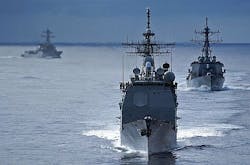Contractor protests could hold up Navy CANES shipboard networking program until December
SAN DIEGO, 9 Sept. 2014. An important multi-billion-dollar U.S. Navy project to upgrade the command, control, communications, computers, intelligence (C4I), and networking equipment aboard the nation's surface warship fleet is being held up for as long as three months due to contractor protests.
The protests involve contracts awarded last month worth as much as $2.53 billion over the next eight years to manufacture equipment for the Navy Consolidated Afloat Networks and Enterprise Services (CANES) shipboard networking program.
Two companies -- DRS Laurel Technologies Inc. in Johnstown, Pa., and CGI Federal Inc. in Lebanon, Va. -- filed protests with the U.S. Government Accountability Office (GAO) in Washington on 2 Sept., which triggered a 100-day stop-work order for the CANES equipment contract. The GAO is the investigative arm of Congress.
In August officials of the Space and Naval Warfare Systems Command (SPAWAR) in San Diego, announced contracts to BAE Systems Technology Solutions & Services Inc. in Rockville, Md.; General Dynamics C4 Systems in Taunton Mass.; Global Technical Systems; in Virginia Beach, Va.; Northrop Grumman Corp. in Herndon, Va.; and Serco Inc. in Reston, Va.
These five companies are to share as much as $2.53 million to manufacture equipment for the CANES program. The Northrop Grumman Corp. Information Systems segment in San Diego is the overall CANES shipboard electronics systems architect, and will install CANES equipment aboard Navy surface warships.
DRS Laurel and CGI Federal had bid on the CANES equipment manufacturing contract but were not chosen. The project will be held up until about 11 Dec. 2014 unless DRS and CGI withdraw their protests.
"CANES represents an essential element of the Navy's modernization plan, including the enhancement of our afloat cybersecurity posture and increased operational effectiveness," says SPAWAR spokesman Steven A. Davis.
Related: Northrop Grumman wins $37 million to produce CANES for U.S. Navy
"We are confident in the source selection process and are working diligently to minimize any schedule impacts to the fleet," Davis says. When the CANES equipment manufacturing program resumes, the program's contractors will compete for orders worth as much as $2.53 billion.
CANES serves as the bridge to the future of Navy afloat networks, consolidating existing legacy and stand-alone networks, providing infrastructure for Tactical applications, systems, and services, Navy officials say. CANES will consolidate and modernize shipboard network systems to improve operational effectiveness and affordability across the fleet.
CANES delivers its capabilities within one system, bringing infrastructure that will enable timely and interoperable information exchange among tactical, support, and administrative users, applications, and computer systems.
Related: Navy steps out on MODERNIZATION
Thus far CANES has been installed on nine destroyers, and is in progress on three aircraft carriers, one amphibious assault ship, eight destroyers, one landing dock ship, and one cruiser, Navy officials say. An additional 28 installations are planned over the next two years. CANES ultimately will be deployed on 180 ships, submarines, and land sites by 2022.
For more information contact SPAWAR online at www.spawar.navy.mil, or the GAO at www.gao.gov.

